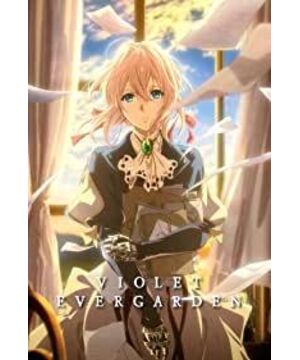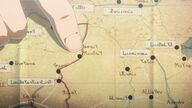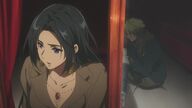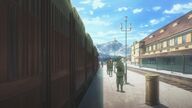This isn't a complete article, and it doesn't necessarily have much to do with Violet Evergarden. It's just a collection of my personal thoughts recently.
"Violet Evergarden" is a slow-paced anime that makes me feel very atmospheric. I think this should be due to KyoAni's superb telling ability and the delicate world carefully constructed - an overhead, fantasy nineteenth century Europe. I'm not saying that the world adds anything to our knowledge of that old Europe, it's clearly a world that typifies a Japanese-style European fantasy of a romantic aristocratic society, which is by no means a reality. The story is a fairy tale after all, but beneath the ostensibly soothing everydayness of the story, I see something historic.
Here I start with one of my classifications of stories, that is, stories can be everyday or historical. The everyday is a state in which both the past and the future are repetitions of the present, or rather in this kind of story the present life seems to be repeated from an indefinite past, and will still be in the future. Keep repeating, here time is homogeneous and history does not advance. The characters in the story live their everyday lives, the plot of the story is weakened, no main character leaves, or even if one leaves someone else continues his or her way of life. I think the daily appearance is mainly to satisfy people's desire, that is, at the end of the fairy tale, the prince and the princess live happily together, so what is life like? People all have the desire to peep into this kind of life, so the story after the story is born. It becomes a kind of story without historical events - historical events that will change the homogeneity of the present and the future so that time is no longer repeated, history begins to move forward, the adventure of the protagonist is about to begin, and the thought The everyday audience should never take the risk. And so the pure everyday is born, which satisfies the needs of the audience who are not adventurous.
Any daily life is imaginary, and there can never be a real daily life in reality. History is moving forward, and people’s life is constantly changing with age, whether it is the past and future of the world, or the past of individuals. Neither the future nor the future can be truly homogeneous, a repetition. When a historical event occurs, there is a rupture between past and future. As we all think, when the epidemic is over, we can return to our previous daily life, as if the epidemic is a disturbance to our calm and undisturbed daily timeline, and when it disappears, the timeline will continue to move forward along the original path. But we didn't expect that we have stepped into a new routine since the outbreak of the epidemic, and prevention and control inspections and masks have become part of life and gradually become accustomed to. That's why we won't return to the pre-pandemic world even if the pandemic does pass. This historical event has brought something different to the present and profound changes to the situation we are in, even if repeated. Occurrence is also a repetition of this new situation, so I say, the timeline is broken. And this is a history that is different from imagined everyday life.
The story of history is the opposite of daily life, with historical events as the main driving force of the plot - the historical events I am talking about here are of course not the real historical events we usually say, but the points I mentioned above that break the past and the future. . This kind of story may follow the logic of the real world and refer to the background of the real world, or it may be completely fictional, but even fiction has a fictional history. This kind of story can be about the world, or it can be just about the individual, because the individual's life also has a history. When the incident happens and the peaceful life of the protagonist is broken, the protagonist steps into a time domain that is no longer the same as before, and the adventure begins. As the plot develops, various accidental or inevitable events occur, and various encounters Or leave, each time making the past and the future no longer the same. And the protagonist may be pursuing a new life, or he may just want to return to the peaceful life of the past. In short, the story will end one day. When everything returns to peace, the daily life seems to come back. It seems that the past history is just the daily life and the daily life An interlude in between. In a more imaginary world, returning to peace really makes the world exactly the same as it was before history, and erasing the middle piece of history can make the two seamless, and the repetition continues without any break. In the more realistic stories, the new peaceful routine is built on a new foundation, and the past never returns. In a fully historicist story, the narrator would imply that the new peaceful daily life is giving birth to new events, there is no real daily state, history is moving non-stop, and the future will never be the same as the past.
Our real world is purely historic. From a macro perspective, the movement of productive forces and production relations always breeds new changes under the calm appearance. The accumulation of these factors and the promotion of accidental factors—such as the outbreak of technology, the occurrence of natural disasters or influential events The accidental decision of the individual - will inevitably bring about the occurrence of historical events, and the completely new factors brought about by historical events can never be completely erased. It will inevitably change the current state of productive forces and production relations, so the state before the historical event cannot be Again, the new routine must be built on a new foundation, and it will breed new changes. From a micro or personal point of view, there are purely contingent events - such as accidents of all kinds - and events that can be said to be accidental on an individual level - such as wars and political tragedies - which obviously profoundly change us Even if you completely exclude these accidental events and imagine a truly peaceful life without waves, isn’t such a life necessarily going from birth to death? Then the irreversible directionality of this journey itself will make tomorrow different from yesterday, making the repeated routine impossible. We do different things at different ages, we go to school, go to school, graduate, work, we meet some people and we leave some people. For a certain period of time, we may be in a relatively stable state of life. We seem to have a routine, doing the same things and getting along with the same people every day, but there are changes behind this state. must lead to its end. We might imagine a higher level of repetition, that while my life journey must have an end, the lives of others, such as my descendants, would constitute a repetition of my life, so that there seems to be a kind of A higher level of everyday life. But at this time, the macro factors mentioned above must be taken into account. Each of us is in history, and we and our descendants must be in different situations. The effect of my existence itself on my descendants Life is a factor that cannot be ignored, and this repetition is denied again.
Going back to Violet Evergarden, I think there is some historicism in this romanticized world. In this world like old Europe, there is a world war like World War I, where technology is constantly improving, such as the development of radio and telephone, which has brought about the crisis of the postal company. These technologies develop quietly in Violet's professional routine, rising day by day like the Eiffel Tower-like radio tower in the background, eventually destroying this peaceful professional routine. The most important theme of this work, the call for peace, also seems to me to be weak compared to this quietly developing force. In this world, these technologies are well integrated into people's lives. It seems that what they bring to people is just more happiness. It seems that as long as war is rejected, everything will develop harmoniously. But let’s be more realistic, the development of productive forces brought about by technological progress is already giving birth to social changes, and wars in the real world do not happen or do not happen just because of people’s wishes, but are guided by the intensification of social contradictions. Disastrous consequences, under the continuous movement of productive forces and production relations, harmonious development is only temporary, old social contradictions and new social contradictions accumulate, and one day a new historical event will occur. We can hope that it is not a disaster. A new war, but these contradictions will be temporarily terminated in this event, and we can foresee that this will not be a harmonious event.
Here we can see the truly romantic place in the world of Violet Evergarden, where there are no poor people at the bottom, it seems that people of every class can live a peaceful life with peace of mind, so that war really becomes no The reason is unexpected, as long as people make some changes in consciousness, let go of hatred and oppose war, eternal peace can be achieved. This is a pre-modern aristocratic society equipped with modern technology, people all follow aristocratic etiquette, retain the interpersonal relationships of the pre-capitalist era, but there is no obvious oppression. If you go back and look at the old Europe of the nineteenth century, you will know whether the real proletarians have such respect for the old aristocracy. Of course I am not asking that this work must truly reflect real history. It is unreasonable to make such a request for a fictional work. We always need to hide in a dream world to seek healing. This need is understandable , and such a dreamy world can inspire some of our emotions, allowing us to maintain our yearning and pursuit for a better world. I just want to say that when we discuss war and peace through this work, we must not forget the limitations of this dreamy perspective. When we deal with problems in the real world, of course we cannot judge according to this dreamy world. Simply talk about peace regardless of conditions. Of course, the yearning for peace and anti-war awareness in this work are definitely of universal significance. The love for living and concrete people is the real reason for us to oppose war, and this work expresses this love To us, we should keep this love in our hearts.
At the end of the theatrical version, when Violet went to the island and finally reunited with the Major, I realized that the world was still relatively open, just like when the new route was just opened, there were many places in the world that had not yet been involved. Throughout the history of the world, as a European you can always imagine an isolated utopia in an unknown ocean. This small island is a peach blossom far away from history, where the daily life of the hero and heroine becomes possible. In the end, let's wish Violet and Major Gilbert a happy life together.
View more about Violet Evergarden reviews











